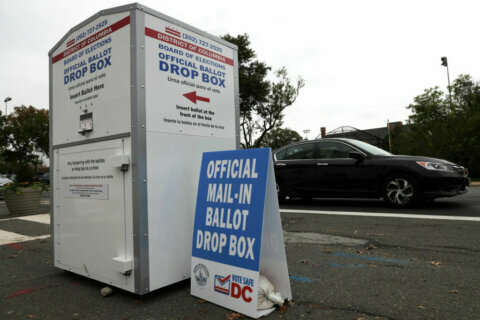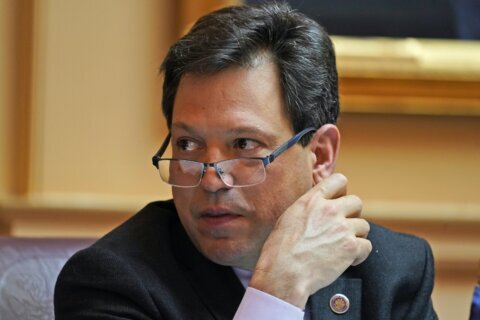ANNAPOLIS, Md. — A Maryland bill that would allow lessons on the risks associated with gambling — including addiction prevention — to be added to the high school health curriculum passed in the state Senate on Feb. 21.
Sen. Bryan Simonaire, R-Anne Arundel, is leading the charge as the bill’s sponsor. He said laws passed from recent legislative sessions that have opened up gambling in the state have raised concerns about increased gambling addiction and abuse problems.
“The Maryland General Assembly has had a direct role in creating this problem of gambling addiction,” Simonaire told Capital News Service.
After a 2008 referendum allowed five slots-only casinos, Maryland continued to pass laws expanding gambling. A 2012 ballot question allowed for the addition of table games and the MGM National Harbor casino, Maryland’s largest, which opened in Prince George’s County in 2016.
Legislation in 2012 mandated the casinos to send annual fees to the Maryland Center of Excellence on Problem Gambling.
Annual assessments of $425 per slot machine and $500 per table game go to the Problem Gambling Fund, managed by the Department of Health — a total of $5.3 million in fiscal year 2019, according to a legislative analysis.
Still, Simonaire said, while he acknowledges money is already being sent to help people with gambling issues, he wants more preventive measures for the state’s youth.
This session, Sen. Craig Zucker, D-Montgomery, introduced Senate bill 4, which would legalize sports betting, further widening the opportunities for gambling in Maryland should it pass.
Now, Senate bill 322 would be a step in combating the dangers that go along with gambling. After passage through the Senate Feb. 21, the bill is scheduled to be heard March 18 in the House’s Ways and Means Committee.
Under the bill, the program would be implemented in the 2021-2022 school year.
“The education community has also had a direct role in this,” Simonaire said at a Feb. 4 hearing. “They supported the gambling, they received the money. So they should also have a direct role in supporting the students who are adversely affected from this.”
The state teacher’s union and local school boards often oppose state mandates on their curriculum, according to Maryland State Education Association communications director Adam Mendelson. The association submitted written testimony against the legislation before the bill’s first hearing.
Simonaire said he met with the Maryland State Department of Education, the state’s superintendents, and the teacher’s union before the Feb. 4 hearing, and scaled back the bill.
The amendments require the Maryland State Department of Education to create lesson plans for the local education agencies to voluntarily choose among, with the stipulation that the state department report back in two years on which jurisdictions implemented them.
The curriculum consists of three hour-long lessons that would teach refusal skills in a health class during the four years of high school, with no added costs, Simonaire said.
Simonaire said the bill is modeled after the Maryland Center of Excellence on Problem Gambling’s 2014 Smart Choices program.
Still, the Maryland Association of Boards of Education remained in full opposition despite the amendments, saying health educators already have too much to teach as it is.
Several university studies have indicated that younger gamblers are at more at risk than the general population.
“We have to recognize a small percentage of people are going to have problems (with gambling abuse),” said Maryland Center of Excellence on Problem Gambling Director Rob White.
The legal gambling age in casinos and poker rooms in Maryland is 21, while anyone 18 and older can gamble through the lottery, bingo and horse racing.
“The intent is to get them the knowledge so they can deal with this,” Simonaire said at the hearing. “Otherwise, there’s a lot of lives lost through this gambling.”
Simonaire told the Education, Health and Environmental Affairs Committee that while the state has set aside financial resources for adult problem gamblers, estimated at about 150,000 in Maryland, educating youths about the dangers of gambling would attack the issue from the front end.
The Baltimore City Board of School Commissioners said in written testimony it opposes the bill because there are too many other high priority health topics to teach, while also suggesting a community school coordinator could address potential gambling problems.
Five laws have been passed in the General Assembly mandating added health instruction since 2012, including lessons on consent, sexual assault, oral health, opioids and CPR. Through written testimony, the Maryland State Department of Education said, the required half-credit of high school health would not allow time for gambling education lessons.
Two lawmakers — Sen. Paul Pinsky, D-Prince George’s, and Sen. Cheryl Kagan, D-Montgomery — voted against the bill’s passage through the Senate on Feb. 21 due to shared concerns about local school mandates, and in this case, workarounds to add curriculum, they told Capital News Service.
Still, Simonaire said, he is prepared to fight for legislation on a matter he is passionate about.
“If the local school boards come back around and say only one (of them) used (the gambling education curriculum), we may have to come back and mandate it and say, ‘Hey, this is important enough that you’ve got to use it,’” said Simonaire.







